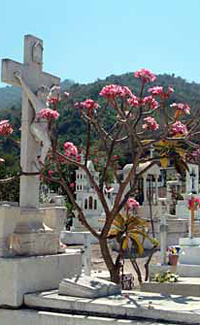 |
 |
 |
 News Around the Republic of Mexico | January 2007 News Around the Republic of Mexico | January 2007  
Immigrant Bodies Return to Tierra Nativa
 Pat Healy - Planet Daily Pat Healy - Planet Daily


| | Puerto Vallarta, Jalisco, Mexico |
Felipe Almaraz seemed to sense that he would die in a foreign land.

The Mexican immigrant of Montrose was only 31 years old but had already suffered two heart attacks. So when his genetically-frail heart seized up for the third and final time, dropping Almaraz as he broke rocks on a construction site, his family knew what to do next.

“When he was alive, he told me that if he died in the United States, he wanted to be buried in his country,” said Antonio Almaraz, Felipe’s brother. “He wanted to be close to his parents.”

Almaraz’s body becomes one more in a lengthening cortege of dead Hispanic immigrants being flown and driven across the border. As immigrant populations across the West swell and age, more and more bodies are being ferried south — mostly to Mexico — for burial in tierra nativa.

“It’s definitely increasing,” said Brett Gowen, owner of the Sunset Mesa funeral home in Montrose. “As we see the influx of generations coming in here, the migrant workers, most of them are shipping back to Mexico.”

In 2001, 70 bodies were shipped to Mexico from Colorado and eastern Wyoming, according to the Mexican consulate in Denver. Last year, there were 155.

But the dead don’t cross the border any easier than the living do. Relatives have to buy special caskets, obtain sheaves of permits, get approval from the Mexican consul and thread other bureaucratic needles. The process can take a more than a week and cost upwards of $5,000.

But for Almaraz’s family, there was no question of where to bury Almaraz.

On Jan. 16, Almaraz collapsed at a house site in Mountain Village, tumbling onto a clump of trash cans. He lay unconscious for 15 minutes before coworkers discovered him. Paramedics shocked his heart back, then flew Almaraz to Grand Junction, where he stayed in a coma for three days before dying.

Seven years after crossing the border, Almaraz’s body arrived back in Zacatecas, in central Mexico, early this week, his brother said. His parents and three sisters got a last glimpse of his body, and week, he was buried after a 4 p.m. Mass.

An uncle and a cousin living in the United States accompanied the body, but Almaraz’s wife, Alejandra, and 6-year-old son, David, stayed behind in Montrose. Not enough money for everyone to go, Antonio Almaraz said.

Almaraz’s 1,100-mile journey from Colorado to Zacatecas began in the Crippin Funeral Home in Montrose. All bodies crossing into Mexico must be embalmed and placed in a special sealed metal coffin.

The funeral home then fills out the death certificate and other documents and sends them on to the Mexican consulate in Denver, which translates the papers into Spanish and issues a permit allowing the body to enter Mexico.

Almaraz’s body was taken to Denver and then put on a plane to Mexico City, where a Mexican funeral home received it at the airport.

“It can be very expensive,” said Julia Crippin, owner of the Cripping Funeral Home. “If it’s a rush, it’s going to take a little more. In this last time we shipped, if we would have waited one more day, it would have cost $1,000. Sometimes the airlines take advantage of the family.”

Jorge Gonzalez Mayagoitia, a Mexican consular official in Denver, said that the consul often offers financial aid to families who can’t pay funeral homes or afford shipment costs. Last year, 59 cases of 155 received some aid, Gonzalez Magagoitia said.

A company in Mexico City even sells repatriation insurance that covers the costs of funeral and shipping a body back to Mexico. The policy, called “Your Homeland in Your Hands,” is good for five years.

The Rev. Oscar James Batista, who works at Telluride Christian Fellowship, said that friends, family and other members of the immigrant community often pool their money to pay to return a body to Mexico.

Children born in the United States to immigrant parents are usually buried here, as are longtime residents, but the vast majority of immigrants prefer to make the return trip. But probably not Batista.

“I don’t have any concern about where I’m buried,” he said. “For me, it’s a lot of money just to move a body. It’s all the same to me. Where the soul goes is the more important question.” | 
 | |
 |



